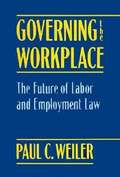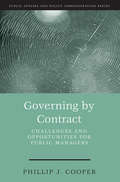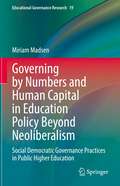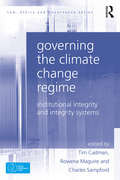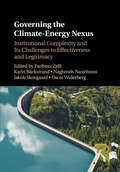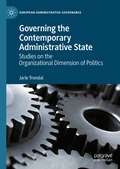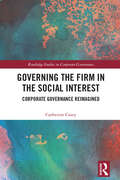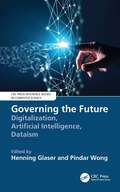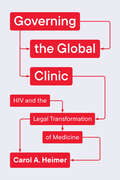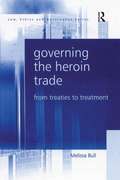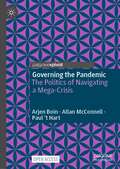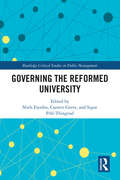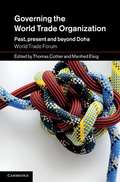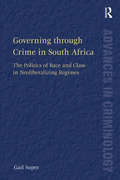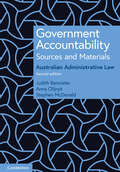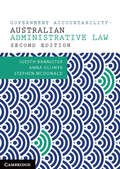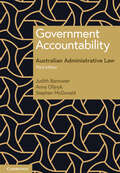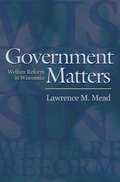- Table View
- List View
Governing The Workplace: The Future Of Labor And Employment Law
by Paul C. WeilerLabor lawyer Paul Weiler examines the social and economic changes that have profoundly altered the legal framework of the employment relationship. He not only discusses a wide range of issues, from wrongful dismissal to mandatory drug testing and pay equity, but he also develops a blueprint for the reconstruction of the law of the workplace, especially designed to give American workers more effective representation.
Governing by Contract: Challenges and Opportunities for Public Managers (Kettl Series)
by Phillip J. CooperIs the public getting a good deal when the government contracts out the delivery of goods and services? Phillip Cooper attempts to get at the heart of this question by exploring what happens when public sector organizations—at the federal, state and local levels—form working relationships with other agencies, communities, non-profit organizations and private firms through contracts. Rather than focus on the ongoing debate over privatization, the book emphasizes the tools managers need to form, operate, terminate or transform these contracts amidst a complex web of intergovernmental relations.Cooper frames the issues of public contract management by showing how managers are caught in between governance by authority and government by contract. By looking at cases ranging from the management of Baltimore schools to the contracting of senior citizen programs in Kansas, he offers practical information to students and practitioners and a theoretical context for their work.At every turn, the author avoids bogging readers down in technical jargon. Instead the book sheds light on a crucial part of any public manager's job with lively case material and no-nonsense guidance for making the most of taxpayer dollars.
Governing by Numbers and Human Capital in Education Policy Beyond Neoliberalism: Social Democratic Governance Practices in Public Higher Education (Educational Governance Research #19)
by Miriam MadsenThis book addresses governing by numbers and human capital policy in higher education by asking how higher education is quantified, how the quantitative information is used in educational governance, and how the information is perceived by students, teachers, managers, and policymakers, and affects decision-making. It also thematically discusses how human capital theory affects the quantification practices and, thereby, their effects. Based on these analyses, the book asks whether governing by numbers and human capital in education policy are necessarily neoliberal practices, and thus questions the theory of global convergence in educational governance.The book provides a thorough analysis of the quantification of graduate outcomes based on the philosophical framework of Agential Realism, thus offering a novel analytical approach to the study of data and indicators in educational governance. The book draws on a comprehensive ethnographic case study from Danish higher education, and relates the findings from this case study to empirical cases in other countries and international research in the field. The book brings together literature from various fields, including political science, accounting, education, and sociology of quantification, in order to provide a comprehensive account of how quantification practices affect education.
Governing the Climate Change Regime: Institutional Integrity and Integrity Systems (Law, Ethics and Governance)
by Tim Cadman Rowena Maguire Charles SampfordThis volume, the second in a series of three, examines the institutional architecture underpinning the global climate integrity system. This system comprises an inter-related set of institutions, governance arrangements, regulations, norms and practices that aim to implement the United Nations Framework Convention on Climate Change (UNFCCC). Arguing that governance is a neutral term to describe the structures and processes that coordinate climate action, the book presents a continuum of governance values from ‘thick’ to ‘thin’ to determine the regime’s legitimacy and integrity. The collection contains four parts with part one exploring the links between governance and integrity, part two containing chapters which evaluate climate governance arrangements, part three exploring avenues for improving climate governance and part four reflecting on the road to the UNFCCC's Paris Agreement. The book provides new insights into understanding how systemic institutional and governance failures have occurred, how they could occur again in the same or different form and how these failures impact on the integrity of the UNFCCC. This work extends contemporary governance scholarship to explore the extent to which selected institutional case studies, thematic areas and policy approaches contribute to the overall integrity of the regime.
Governing the Climate-Energy Nexus: Challenges to Coherence, Legitimacy and Effectiveness
by Fariborz Zelli Jakob Skovgaard Karin Bäckstrand Naghmeh Nasiritousi Oscar WiderbergCombating climate change and transitioning to fossil-free energy are two central and interdependent challenges facing humanity today. Governing the nexus of these challenges is complex, and includes multiple intergovernmental and transnational institutions. This book analyses the governance interactions between such institutions, and explores their consequences for legitimacy and effectiveness. Using a novel analytical framework, the contributors examine three policy fields: renewable energy, fossil fuel subsidy reform, and carbon pricing. These fields are compared in terms of their institutional memberships, governance functions and overarching norms. Bringing together prominent researchers from political science and international relations, the book offers an essential resource for future research and provides policy recommendations for effective and legitimate governance of the climate-energy nexus. Rooted in the most recent research, it is an invaluable reference for researchers, policymakers and other stakeholders in climate change and energy politics.
Governing the Commons
by Elinor OstromCongratulations to Elinor Ostrom, Co-Winner of The Sveriges Riksbank Prize in Economic Sciences in Memory of Alfred Nobel 2009!The governance of natural resources used by many individuals in common is an issue of increasing concern to policy analysts. Both state control and privatization of resources have been advocated, but neither the state nor the market have been uniformly successful in solving common pool resource problems. After critiquing the foundations of policy analysis as applied to natural resources, Elinor Ostrom here provides a unique body of empirical data to explore conditions under which common pool resource problems have been satisfactorily or unsatisfactorily solved. Dr. Ostrom first describes three models most frequently used as the foundation for recommending state or market solutions. She then outlines theoretical and empirical alternatives to these models in order to illustrate the diversity of possible solutions. In the following chapters she uses institutional analysis to examine different ways--both successful and unsuccessful--of governing the commons. In contrast to the proposition of the tragedy of the commons argument, common pool problems sometimes are solved by voluntary organizations rather than by a coercive state. Among the cases considered are communal tenure in meadows and forests, irrigation communities and other water rights, and fisheries.
Governing the Contemporary Administrative State: Studies on the Organizational Dimension of Politics (European Administrative Governance)
by Jarle TrondalThis book examines the transformation of the administrative state, since it was first coined by Dwight Waldo seventy years ago. Empirically, the book assesses how the administrative state is facing endogenous reforms through administrative devolution, as well as exogenous shifts by the rise of multilevel administrative systems and international bureaucracy. Facing dual shifts, the book offers a comprehensive analysis of how the administrative state handles three interconnected challenges: first, a need for innovation and reform, as well as stability and robustness; second, administrative autonomy among regulatory bodies, as well as political leadership and democratic accountability; and third, nation-state sovereignty and international collaboration. It also highlights the robust character of the administrative state by demonstrating profound stability in public governance even during times of profound turbulence. It will appeal to scholars and students of public policy, public administration and global governance, as well as practitioners interested in new developments in public governance.
Governing the Firm in the Social Interest: Corporate Governance Reimagined (Routledge Studies in Corporate Governance)
by Catherine CaseyThe corporate business enterprise is a core institution of capitalism. It holds immense political, economic, and cultural power in society. It mobilizes social and planetary resources to its utility in pursuit of private profit maximization and with little regard for social concerns. Its influence over so much of societal life and effects on the natural environment raise critical questions about the firm and its governance in democratic society. Various voices seek reforms of regulation and corporate governance practices to those shaped by the neoliberal policies persisting in the current decades. But prospects for amelioration within our current horizons of thinking appear elusive. This book contributes a distinctly social theoretical approach to the social problem of governing the firm. Its discussions complement debates in economics, politics, and law. Its critical social theorizations challenge conventional understandings of the firm and neoliberal legitimacies of its governance and posit alternatives. The book explores the social relations and moral fabric of the firm and the creativity of human action at work. It proposes a reimagined corporate governance premised on just recognition of that social vitality. It invites unprecedented collaboration for a robust participatory democracy for governing the firm and market action oriented to ecological and social sustainability.
Governing the Future: Digitalization, Artificial Intelligence, Dataism (CRC Press Reference Books in Computer Science)
by Henning Glaser Pindar WongWe are living in times of deep and disruptive change. Perhaps the most powerful vector of this change can be described by three related catchphrases: digitalization, artificial intelligence, and dataism. Drawing on considerable expertise from a wide range of scholars and practitioners, this interdisciplinary collection addresses the challenges, impacts, opportunities and regulation of this civilizational transformation from a variety of angles, including technology, philosophy, cultural studies, international law, sociology and economics. This book will be of special interest to scholars, students, analysts, policy planners, and decision-makers in think tanks, international organizations, and state agencies studying and dealing with the development and governance of disruptive technologies.
Governing the Global Clinic: HIV and the Legal Transformation of Medicine (Chicago Series in Law and Society)
by Carol A. HeimerA deep examination of how new, legalistic norms affected the trajectory of global HIV care and altered the practice of medicine. HIV emerged in the world at a time when medicine and healthcare were undergoing two major transformations: globalization and a turn toward legally inflected, rule-based ways of doing things. It accelerated both trends. While pestilence and disease are generally considered the domain of biological sciences and medicine, social arrangements—and law in particular—are also crucial. Drawing on years of research in HIV clinics in the United States, Thailand, South Africa, and Uganda, Governing the Global Clinic examines how growing norms of legalized accountability have altered the work of healthcare systems and how the effects of legalization vary across different national contexts. A key feature of legalism is universalistic language, but, in practice, rules are usually imported from richer countries (especially the United States) to poorer ones that have less adequate infrastructure and fewer resources with which to implement them. Challenging readers to reconsider the impulse to use law to organize and govern social life, Governing the Global Clinic poses difficult questions: When do rules solve problems, and when do they create new problems? When do rules become decoupled from ethics, and when do they lead to deeper moral commitments? When do rules reduce inequality? And when do they reflect, reproduce, and even amplify inequality?
Governing the Hearth
by Michael GrossbergPresenting a new framework for understanding the complex but vital relationship between legal history and the family, Michael Grossberg analyzes the formation of legal policies on such issues as common law marriage, adoption, and rights for illegitimate children. He shows how legal changes diminished male authority, increased women's and children's rights, and fixed more clearly the state's responsibilities in family affairs. Grossberg further illustrates why many basic principles of this distinctive and powerful new body of law--antiabortion and maternal biases in child custody--remained in effect well into the twentieth century.
Governing the Heroin Trade: From Treaties to Treatment (Law, Ethics And Governance Ser.)
by Melissa BullExamining the historical, economic and political context for the current prohibition of particular drugs, this study investigates the problem of drug control and provides a systematic analysis of the development of the international system of regulation. It identifies the political rationalities that provided the basis of that system and positions these moral justifications for exercising power in relation to the practical programmes that put them into practice. The work not only catalogues the techniques and strategies employed in the process of governing illicit drugs, it also notes the failures, unintended consequences and other difficulties associated with getting such programmes to work. It will be of key interest to students and scholars of crime and criminology, law and society, medico-legal studies and health studies.
Governing the Pandemic: The Politics of Navigating a Mega-Crisis
by Arjen Boin Allan McConnell Paul 't HartThis open access book offers unique insights into how governments and governing systems, particularly in advanced economies, have responded to the immense challenges of managing the coronavirus pandemic and the ensuing disease COVID-19. Written by three eminent scholars in the field of the politics and policy of crisis management, it offers a unique ‘bird’s eye’ view of the immense logistical and political challenges of addressing a worst-case scenario that would prove the ultimate stress test for societies, governments, governing institutions and political leaders. It examines how governments and governing systems have (i) made sense of emerging transboundary threats that have spilled across health, economic, political and social systems (ii) mobilised systems of governance and often fearful and sceptical citizens (iii) crafted narratives amid high uncertainty about the virus and its impact and (iv) are working towards closure and a return to ‘normal’ when things can never quite be the same again. The book also offers the building blocks of pathways to future resilience. Succeeding and failing in all these realms is tied in with governance structures, experts, trust, leadership capabilities and political ideologies. The book appeals to anyone seeking to understand ‘what’s going on?’, but particularly academics and students across multiple disciplines, journalists, public officials, politicians, non-governmental organisations and citizen groups.
Governing the Reformed University (Routledge Critical Studies in Public Management)
by Carsten Greve Niels Ejersbo Signe Pihl-ThingvadUniversities are important public institutions and are seen as key drivers for a country’s economic and intellectual development. Their ability to deliver relevant research and education at the highest level have an impact on growth and progress in society, and governments attempt to control and govern the development of the universities. It is no longer left to the individual researcher or the institution to determine the role of the university. Universities have traditionally had a special role in society with a high degree of autonomy and independence. They have been described as a self-governing Republic of Science and their internal organization is characterized as "academic tribes". However, universities can also be viewed as institutions with somewhat similar characteristics as other public institutions with highly professionalized staff. Governing the Reformed University is a coherent volume based on a unique data set. The aim of the book is to quantitatively and qualitatively understand and explain how reforms and management instruments are implemented and how it influences different levels of the organization from the top management level to the employees within universities. It contributes to the knowledge of reform and reform impact in higher education. It also adds to our understanding of management and governance at universities and through which mechanisms management works at universities. This book builds on and adds to the knowledge of studies of reform and governance at universities. The data used in the book consists of a number of data sets and is collected as part of a comprehensive research project. Academics and policy makers alike in the fields of public administration, public management, public policy, educational studies and accountancy will find this of high interest.
Governing the Use-of-Force in International Relations
by Ingvild Bode Aiden WarrenThis book examines US recourse to military force in the post-9/11 era. In particular, it evaluates the extent to which the Bush and Obama administrations viewed legitimizing the greater use-of-force as a necessary solution to thwart the security threat presented by global terrorist networks and WMD proliferation.
Governing the World Trade Organization
by Thomas Cottier Manfred ElsigLike many other international organizations, the World Trade Organization stands at a crossroads. There is an obvious imbalance between the organization's dispute settlement arm and its negotiation platform. While its current rules, supported by a strong dispute settlement system, have provided some buffering against the negative effects of the financial crises, its negotiation machinery has not produced any substantial outcomes since the late 1990s. It has become obvious that the old way of doing business does not work any more and fresh ideas about governing the organization are needed. Based on rigorous scholarship, this volume of essays offers critical readings on the functioning of the system and provides policy-relevant ideas that go beyond incremental redesign but avoid the trap of romantic scenarios.
Governing through Crime in South Africa: The Politics of Race and Class in Neoliberalizing Regimes (New Advances in Crime and Social Harm)
by Gail SuperThis book deals with the historic transition to democracy in South Africa and its impact upon crime and punishment. It examines how the problem of crime has emerged as a major issue to be governed in post-apartheid South Africa. Having undergone a dramatic transition from authoritarianism to democracy, from a white minority to black majority government, South Africa provides rich material on the role that political authority, and challenges to it, play in the construction of crime and criminality. As such, the study is about the socio-cultural and political significance of crime and punishment in the context of a change of regime. The work uses the South African case study to examine a question of wider interest, namely the politics of punishment and race in neoliberalizing regimes. It provides interesting and illuminating empirical material to the broader debate on crime control in post-welfare/neoliberalizing/post transition polities.
Government Accountability
by Gabrielle Appleby Judith Bannister Gabrielle Appleby Anna Olijnyk Joanna Howe Judith Bannister Anna OlijnykGovernment Accountability: Australian Administrative Law offers an accessible introduction to administrative law in Australia by reference to its guiding principle, accountability. The book explores the complex theory underlying this area of law through the inclusion of many examples and with an emphasis on practicalities. It introduces the multifaceted nature of government, its structure, powers and actions. It explains and analyses in detail the principles and mechanisms of administrative law in a way that equips students to employ them in the context of new and unfamiliar cases. Throughout the book, the theory, law and practice of Australian administrative law are explored by reference to the overarching concept of accountability. Government Accountability is a concise introduction to administrative law in Australia that clearly explains the intricacies of the field and provides readers with the theoretical and practical knowledge to analyse the decisions and actions of government.
Government Accountability Sources and Materials
by Judith Bannister Anna Olijnyk Stephen McDonaldGovernment Accountability Sources and Materials: Australian Administrative Law is designed to accompany the third edition of the textbook Government Accountability: Australian Administrative Law. Following the accessible structure of Government Accountability, this book guides students through the real-world operation of administrative law and demonstrates how multiple doctrines and mechanisms can interact in a single situation. Extracts from primary materials – including cases and legislation – provide a clear account of the facts, issues and statutory provisions considered by the courts, and are accompanied by relevant commentary. This edition has been thoroughly updated to include recent significant cases such as Minister for Immigration, Citizenship, Migrant Services and Multicultural Affairs v Viane (2021), Hocking v Director-General of the National Archives of Australia (2020) and MZAPC v Minister for Immigration and Border Protection (2021). Written by a team of experts, Government Accountability Sources and Materials: Australian Administrative Law is a fundamental and student-friendly introduction to administrative law in practice.
Government Accountability: Australian Administrative Law
by Judith Bannister Anna Olijnyk Stephen McDonaldThe second edition of Government Accountability: Australian Administrative Law offers an accessible and practical introduction to administrative law in Australia. The text introduces the legal principles that regulate the exercise of power by public authorities and explains the legal mechanisms that exist to remedy failures, with an emphasis on the overarching principle of accountability. Thoroughly revised and updated to incorporate recent changes to case law and legislation, this edition offers expanded, contemporary material on public investigatory bodies, information disclosure, administrative review tribunals, the limits on juridical review, and procedural fairness. Updated case examples throughout illustrate the practical operation of these principles and assist readers to connect theory with practice. Government Accountability provides readers with a concise introduction to the contexts, theory and application of administrative law and arms students with the knowledge and skills to successfully analyse and assess the decisions and actions of public authorities.
Government Accountability: Australian Administrative Law
by Judith Bannister Anna Olijnyk Stephen McDonaldGovernment Accountability: Australian Administrative Law presents a thorough account of the administrative state and the mechanisms that exist to bring it to account for its actions. It contextualises the theory and explanation of administrative law through carefully chosen case studies and events that offer practical examples of the principles discussed and how they are applied. The third edition has been thoroughly updated to incorporate recent legal developments and includes expanded discussion of 'materiality' in the context of jurisdictional error. The examples used illustrate the operation of legal principles and reflect contemporary social and political circumstances. Written by a team of experts, and known for its clear, consistent and straightforward narrative with logical progression, Government Accountability remains a student-friendly guide to complex administrative law concepts. Government Accountability: Australian Administrative Law is accompanied by a casebook, Government Accountability Sources and Materials: Australian Administrative Law, which provides curated cases and primary legal materials with helpful commentary.
Government Cloud Procurement: Contracts, Data Protection, and the Quest for Compliance
by Kevin McGillivrayIn Government Cloud Procurement, Kevin McGillivray explores the question of whether governments can adopt cloud computing services and still meet their legal requirements and other obligations to citizens. The book focuses on the interplay between the technical properties of cloud computing services and the complex legal requirements applicable to cloud adoption and use. The legal issues evaluated include data privacy law (GDPR and the US regime), jurisdictional issues, contracts, and transnational private law approaches to addressing legal requirements. McGillivray also addresses the unique position of governments when they outsource core aspects of their information and communications technology to cloud service providers. His analysis is supported by extensive research examining actual cloud contracts obtained through Freedom of Information Act requests. With the demand for cloud computing on the rise, this study fills a gap in legal literature and offers guidance to organizations considering cloud computing.
Government Gangsters: The Deep State, the Truth, and the Battle for Our Democracy
by Kash Pramod Patel&“A brilliant roadmap highlighting every corrupt actor, to ultimately return our agencies and departments to work for the American People…we will use this blueprint to help us take back the White House and remove these Gangsters from all of Government!&” —Donald J. Trump The highest levels of government have been infiltrated by an anti-democratic Deep State that can be defeated by refocusing our national security mission and relentlessly defending the truth.A sinister cabal of corrupt law enforcement personnel, intelligence agents, and military officials at the highest levels of government plotted to overthrow a president. Even after they failed, they continue to secretly pull the levers of power without any accountability to the American people. This isn&’t the synopsis of a fictional spy thriller. This is what is actually happening in the United States government. In Government Gangsters, Kash Patel—a former top official in the White House, the Department of Defense, the Intelligence Community, and the Department of Justice—pulls back the curtain on the Deep State, revealing the major players and tactics within the permanent government bureaucracy, which has spent decades stripping power away from the American people and their elected leaders. Based on his firsthand knowledge, Patel reveals how we can defeat the Deep State, reassert self-government, and restore our democracy.
Government Intervention in the Reorganisation of Listed Companies in China
by Huimiao ZhaoAs a comprehensive empirical study on the bankruptcy re-organisations of listed companies in China, this book examines the re-organisation of fifty-three listed companies entering bankruptcy between 2007 and 2018. It features raw data from thousands of public announcements of listed companies, helping to present a precise panorama of bankruptcy law in China. The author discusses the nature, extent and appropriateness of government intervention in bankruptcies of listed companies. It also examines the effects of bankruptcy institutions established by the bankruptcy laws to constrain government intervention. The findings suggest that such laws have been inadequate to prevent government intervention. In fact, the biggest obstacle to the smooth implementation of China's reorganisation system is government intervention, one distinct characteristic of the socialist market economy. The book will have broader relevance in terms of informing the debate concerning the government's continuing intervention in economic activity in China.
Government Matters: Welfare Reform in Wisconsin
by Lawrence M. Mead"Good government" is commonly seen either as a formidable challenge, a distant dream, or an oxymoron, and yet it is the reason why Wisconsin led America toward welfare reform. In this book, Lawrence Mead shows in depth what the Badger State did and--just as important--how it was done. Wisconsin's welfare reform was the most radical in the country, and it began far earlier than that in most other states. It was the achievement of legislators and administrators who were unusually high-minded and effective by national standards. Their decade-long struggle to overhaul welfare is a gripping story that inspires hope for better solutions to poverty nationwide. Mead shows that Wisconsin succeeded--not just because it did the right things, but because its government was unusually masterful. Politicians collaborated across partisan lines, and administrators showed initiative and creativity in revamping welfare. Although Wisconsin erred at some points, it achieved promising policies, which then had good outcomes in terms of higher employment and reduced dependency. Mead also shows that these lessons hold nationally. It is states with strong good-government traditions, such as Wisconsin, that typically have implemented welfare reform best. Thus, solutions to poverty must finally look past policies and programs to the capacities of government itself. Although governmental quality is uneven across the states, it is also improving, and that bodes well for better antipoverty policies in the future.
